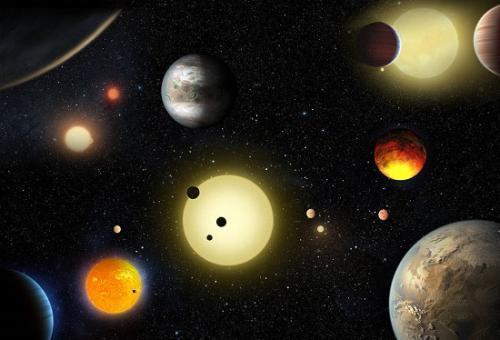(单词翻译:单击)
听力文本
This is Scientific American — 60-Second Science. I'm Steve Mirsky.
Astronomers have catalogued more than 3,500 exoplanets since the first one was found in 1988.
"Part of the revelation and the revolution that's going on is that actually planets are incredibly abundant and that means that potential incubators for life are everywhere in the universe."
Columbia University astronomer and Scientific American blogger Caleb Scharf. He was part of a conversation about life in the universe at N.Y.U. on March 22nd. At which he was asked what our new understanding of the abundance of exoplanets out there does to the odds of finding life.
"What it definitely does is increase the odds of us finding an answer. I think. I think that we can say with some confidence. Because we didn't know that there were so many planets around other stars 20 years ago...and that also means that many of them are pretty nearby to us. So what it definitely alters is the odds of us getting some answers."

"Because suppose planets were actually very rare. Suppose the solar system was sitting here and then you had to go a thousand light years to the next planetary system. That would be difficult for us if we wanted to study those planets because they're a long way away. So I'm doing the politician thing of kind of circling around the question here. So it definitely, the abundance of planets improves the odds of us obtaining an answer, which is huge. Don't underestimate that. What does it mean for the actual probability of there being other life out there and how often it occurs? If I'm completely honest with you—we don't know."
You can watch the full 90-minute discussion featuring Scharf, Scientific American's Lee Billings and Wall Street Journal science writer Robert Lee Hotz at the N.Y.U. Journalism Web site. Just go to journalism.nyu.edu and look for the series of Kavli Conversations on Science Communication.
For Scientific American — 60-Second Science Science. I'm Steve Mirsky.
参考译文
这里是科学美国人——60秒科学。我是史蒂夫·米尔斯基。
自1988年首次发现系外行星以来,天文学家已经将超过3500颗系外行星收入目录。
“正在展开的部分启示和变革是,实际上行星的数量极为丰富,这意味着潜在的生命孵化器在宇宙中无处不在。”
凯莱布·沙尔夫是哥伦比亚大学的天文学家兼《科学美国人》的博主。他参加了3月22日在纽约大学举行的有关宇宙生命的的谈话。他被问及系外行星数量丰富这一新认识对发现生命的可能性有何意义。
“我认为,这肯定会增加我们找到答案的几率。我认为我们可以自信地这样说。因为我们不知道20年前其他恒星周围有这么多行星,这也意味着我们周围有很多行星。因此,我们得到答案的几率一定会发生变化。”
“因为我们此前认为行星数量稀少。假设太阳系在这里,你要用1000光年才能到达下一个行星系。研究这些行星对我们来说非常困难,因为它们离我们太远了。所以我要像政治家那样,对这个问题绕下弯子。可以肯定的是,行星数量丰富会增加我们获得答案的几率,这非常重要,不要低估它的重要性。这对其他生命存在的实际概率有何意义?出现频率是多少?如果要我完全诚实地告诉你,我会说我们也不知道。”
听众朋友可以在纽约大学新闻网站上观看90分钟完整版的讨论,参与讨论的有沙尔夫、《科学美国人》的李·比林斯和《华尔街日报》的科学作家罗伯特·李·霍茨。访问journalism. nyu. Edu网站,搜索“卡夫利科学传播谈话系列”即可。
谢谢大家收听科学美国人——60秒科学。我是史蒂夫·米尔斯基。
译文为可可英语翻译,未经授权请勿转载!
重点讲解
重点讲解:
1. go on 进行;发生;
例句:I don't know what's going on.
我不知道发生了什么事。
2. part of 一些;部分;
例句:I grew up as part of a large household.
我是在一个大家庭里长大的。
3. look for 找;寻;
例句:I've looked for it all over the shop.
我到处都找过了。


